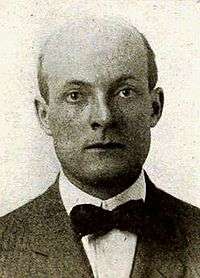Homer Croy

Homer Croy (March 3, 1883 - May 24, 1965), was an American author and occasional screenwriter who wrote fiction and non-fiction books about life in the Midwestern United States. He also wrote several popular biographies, including books on outlaw Jesse James, humorist Will Rogers and film director D.W. Griffith.
Croy was born on a farm northwest of Maryville, Missouri, and published his first book, When to Lock the Stable, in 1914. During World War I he was production manager in Paris, France, for the Community Motion Picture Bureau, which distributed movies to Allied troops.[1] His first successful book was West of the Water Tower published in 1923. It dealt with hypocrisy in a small town, "Junction City," which was a thinly disguised version of Maryville; a sequel, R.F.D. #3, appeared the following year.
Croy's most famous work was the novel They Had to See Paris (1926), about a rural couple from Missouri on a European trip. The book was filmed in 1929 as the first talking picture to star Will Rogers.
Croy had a long but intermittent association with the motion picture industry. Many of his novels and stories were adapted for the screen, and he also directed a series of short travelogue films in 1914-1915; he received screenwriting credits on a handful of feature films in the 1930s. In addition to his biography of D.W. Griffith, he also wrote about the film industry in his 1918 book How Motion Pictures Are Made and a 1932 novel Headed for Hollywood.
In 2010 an edited selection of Croy's writing was collected with an introduction by Zachary Michael Jack entitled Homer Croy: Corn Country (Ice Cube Press).
Selected bibliography
- 1914 When to Lock the Stable
- 1918 How Motion Pictures Are Made
- 1918 Boone Stop
- 1920 Turkey Bowman
- 1923 West of the Water Tower
- 1924 R.F.D. No. 3
- 1926 They Had to See Paris
- 1929 Coney Island
- 1932 Headed for Hollywood
- 1942 Family Honeymoon
- 1947 Corn Country
- 1949 Jesse James Was My Neighbor
- 1953 Our Will Rogers
- 1959 Star Maker: The Story of D.W. Griffith
Selected motion picture credits
- 1932 Down to Earth (co-screenplay with Edwin J. Burke; a follow-up to They Had to See Paris)
- 1933 The Cohens and Kellys in Trouble (one of five credited screenwriters)
- 1936 The Harvester (one of four credited screenwriters)
See also
- Lee Shippey, with whom Croy roomed in Paris during World War I
References
- ↑ Lee Shippey, Luckiest Man Alive, Los Angeles: Westernlore Press (1959), pages 65–66
External links
- Internet Movie Database listing
- University of Missouri biography
- MSN Filmography
- Internet Broadway Database listing
- Article by Croy about Will Rogers
|